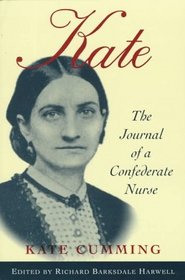This is an interesting book which fully delivers on what the description promises. I'd also like to say Kate Cumming deserves praise for spending almost all four years of the war working in Confederate hospitals caring for the wounded of both sides. Many other Southern women of her class gave only vocal support.
However, it is also a book of contradictions and misinformation. For example, Ms. Cumming will state how the women of the South rallied to help the cause, then writes about numerous instances of women who only care for themselves and their comfort. Actually, toward the end of the war, it was the women of the South who began to write their husbands asking them to desert and return home.
She often lists large numbers of casualties for Union forces, but never for Confederate forces. At the same time, she constantly writes of the large numbers of Confederate wounded arriving in the hospitals, and she constantly writes of men she knew who were killed.
Plus, she believes every rumor she hears, and doesn't correct the rumors in her diary when she obviously must have heard the truth.
For example, she had Confederate General Hood winning a great victory at Franklin in the early Winter of 1864, when in fact his army suffered a terrible defeat. Then she has him capturing Nashville and afterwards leaving it. That battle was also a Union victory which effectively destroyed Hood's army.
The worst occurred at the end of the war when she writes in her diary the Union army took 60,000 casualties in the final assault which captured Richmond and Petersburg. Didn't happen.
Then she has the war ending with an armistice forced by the French who, in April 1865, "recognized the Confederacy," with the French fleet destroying the Union fleet off Mobile, Alabama. A few days later, she writes the rumor was confirmed. Obviously, she was clutching at straws in hopes of a Confederate victory.
Finally, in a number of pages of her diary, she writes of her low opinion of the Negroes, who were---according to her---much better off as Southern slaves than they would have been with the "terrible abolitionists" who would set them free. In one case, she writes of how stupid Negroes were and that they were incapable of learning anything. And she claims the Negroes couldn't fight as soldiers, which the Union Afro-American regiments proved false time and again.
This book is valuable for its description of Ms. Cumming's actions as a nurse and her interaction with the medical staff, as well as her description of life in a Confederacy which was gradually, and then quickly, losing the war. In other areas, readers should keep an open mind with some skepticism.
However, it is also a book of contradictions and misinformation. For example, Ms. Cumming will state how the women of the South rallied to help the cause, then writes about numerous instances of women who only care for themselves and their comfort. Actually, toward the end of the war, it was the women of the South who began to write their husbands asking them to desert and return home.
She often lists large numbers of casualties for Union forces, but never for Confederate forces. At the same time, she constantly writes of the large numbers of Confederate wounded arriving in the hospitals, and she constantly writes of men she knew who were killed.
Plus, she believes every rumor she hears, and doesn't correct the rumors in her diary when she obviously must have heard the truth.
For example, she had Confederate General Hood winning a great victory at Franklin in the early Winter of 1864, when in fact his army suffered a terrible defeat. Then she has him capturing Nashville and afterwards leaving it. That battle was also a Union victory which effectively destroyed Hood's army.
The worst occurred at the end of the war when she writes in her diary the Union army took 60,000 casualties in the final assault which captured Richmond and Petersburg. Didn't happen.
Then she has the war ending with an armistice forced by the French who, in April 1865, "recognized the Confederacy," with the French fleet destroying the Union fleet off Mobile, Alabama. A few days later, she writes the rumor was confirmed. Obviously, she was clutching at straws in hopes of a Confederate victory.
Finally, in a number of pages of her diary, she writes of her low opinion of the Negroes, who were---according to her---much better off as Southern slaves than they would have been with the "terrible abolitionists" who would set them free. In one case, she writes of how stupid Negroes were and that they were incapable of learning anything. And she claims the Negroes couldn't fight as soldiers, which the Union Afro-American regiments proved false time and again.
This book is valuable for its description of Ms. Cumming's actions as a nurse and her interaction with the medical staff, as well as her description of life in a Confederacy which was gradually, and then quickly, losing the war. In other areas, readers should keep an open mind with some skepticism.




